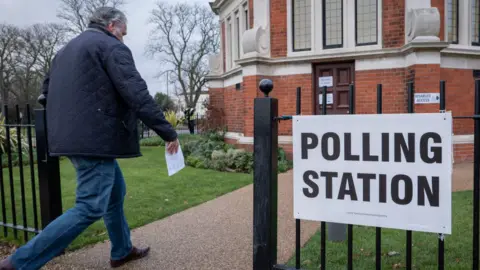Local elections 2023: 4% of voters without voter ID apply through scheme
 Getty Images
Getty ImagesAbout 4% of the estimated two million people who do not have valid ID have signed up for a government scheme to allow them to vote.
May's local elections will be the first time all voters in England must show photo ID.
Some 85,000 people have applied online for a free Voter Authority Certificate ahead of the deadline for May's poll.
The government said the vast majority of voters already had an accepted form of ID.
A spokesman for the Department for Levelling Up, Housing and Communities (DLUHC) added that voter ID was "vital" to "keep our democracy secure" and "prevent the potential for voter fraud".
But campaigners said the scheme had been "an absolute failure" and left people at risk of being turned away from voting because they didn't have the right ID.


Valid forms of ID include passports, driving licences and older or disabled person's bus passes.
However, people without any of these could apply for a free alternative, known as a Voter Authority Certificate.
The deadline to apply to get a certificate in time for England's local elections on 4 May was 17:00 BST.
A total of 85,185 people applied online for a certificate ahead of the deadline, according to the government's dashboard.
The figure does not include people who applied by post or in person. Others may have applied for a different form of valid ID.
Photo ID is also not required for postal votes.
An estimated two million adults who are eligible to vote in England, Scotland and Wales do not have recognisable photo ID, according to research carried out for the government.
Dr Jess Garland, director of policy and research at the Electoral Reform Society, said "the door has been slammed shut for many would-be voters who lack the required ID to cast a ballot in May's elections".
"Despite repeated warnings that these new rules could disenfranchise millions of legitimate voters, the government pushed ahead with this unnecessary policy," she said.
Tom Brake, from campaign group Unlock Democracy, said the figures showed the Voter Authority Certificate scheme had been "an absolute failure" and that the new voter ID requirement's were "a clear and present danger to democracy".
A DLUC spokesman said: "The vast majority of voters already own an accepted form of identification and a significant number of people will vote by post.
"The government has also been working closely with local authorities and other partners to raise awareness, including a widespread public information campaign led by the Electoral Commission."
Some 230 councils in England are holding elections on 4 May but there are no elections next month in Scotland or Wales.
Responding to criticism of voter ID requirements earlier this year, local government minister Lee Rowley said a large number of those who did not have valid ID would not have elections in their area this year.
He added that a number of this group would also choose not to vote - "much as we would like them to do so".
The Local Government Association had warned that staff overseeing May's local elections could be "overwhelmed" with enquiries and voter certificate applications ahead of polling day.
In the past five years there has been "no evidence of large-scale electoral fraud", according to the Electoral Commission, with only nine convictions and six police cautions issued in relation to such cases.
Voter ID was trialled for some council areas in England during local elections in 2018 and 2019.
The Electoral Commission said many of the people who were initially refused a ballot for not having ID did return with it later, and the number of those that did not not was fairly small.
Voters across the UK will be required to show ID at the next general election, which is widely expected in 2024.
Photo ID has been mandatory for elections in Northern Ireland since 2003, where there is a free electoral ID card available.
